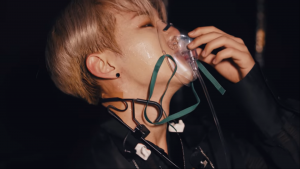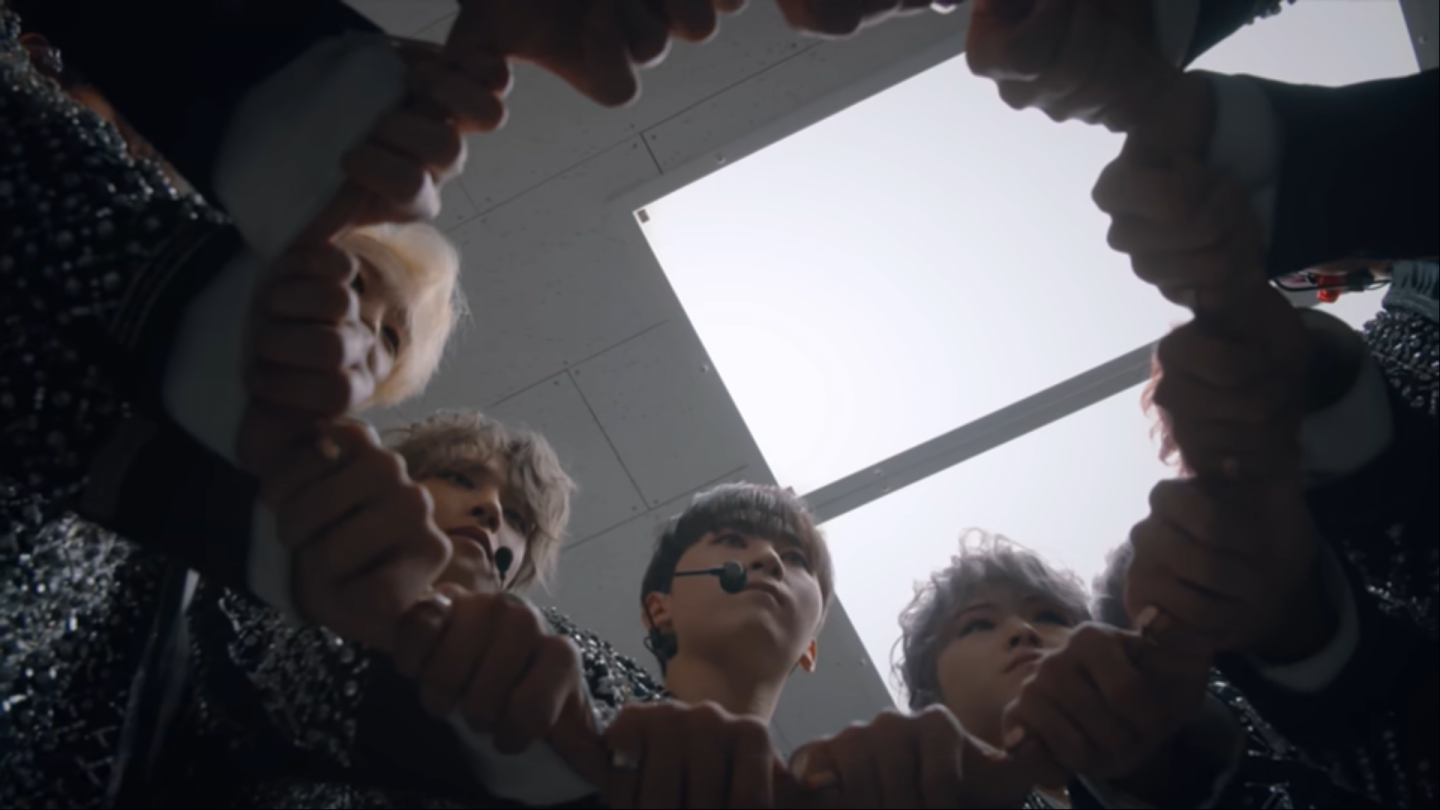
Seventeen’s Hit the Road, a fifteen-episode docuseries following the group on their 2019-2020 Ode to You world tour, recently aired on YouTube and Weverse. Despite the hustle and bustle of tour life, the series is slow and intimate, focusing on Seventeen’s daily routines, challenges, and moments of introspection. Hit the Road has numerous flaws, but it is ultimately an insightful and moving portrait of Seventeen, putting the love each member has for their group and their fans center stage.
While Hit the Road is ostensibly a tour documentary, it is the members and their experiences that are the focus of the show. There is plenty of performance footage, but its main purpose is to contribute to the individual stories that are being shared, and it is often overlaid with interviews from the members. When the docuseries offers insights into the tour process, they are also framed through a personal perspective. For instance, there are several scenes that show Seventeen using their rehearsal time to adjust formations and staging, usually in response to the absence of one or more members. These sequences demonstrate Seventeen’s skills, and highlight the flexibility required of touring artists. However, the emphasis is on the morale of the group, and the emotions of the members who can’t participate due to injury or illness. Likewise, in a scene which depicts the cancellation of a significant part of the tour due to the Coronavirus, the focus is fully on Seventeen’s disappointment at not being able to fulfill their promise to perform for fans, rather than the logistical complications which no doubt ensued.
The one exception to this rule is the first episode, “Prologue”, which concentrates on the process of conceptualizing and preparing the Ode to You world tour. While “Prologue” is an engaging episode, it is fairly misleading in terms of the content of the rest of the show. Hit the Road is a documentary that cares most about the thoughts, feelings, and experiences of Seventeen’s members while on tour, rather than the tour itself. This focus is shown through the personal lens applied to even the most concert-centric sequences, and by the fact that much of the runtime is filled with member interviews.
One of the most unique aspects of Hit the Road is that, apart from “Prologue” and the finale “Epilogue”, each episode concentrates on one member. This structure is not explicitly introduced and therefore “For You to Walk Comfortably”, the first episode to highlight an individual member, is rather confusing. However, subsequent episodes solidify and clarify the construct. Besides its shaky start, the choice to showcase one member per episode works remarkably well. It allows the show to shift tones between episodes without feeling inconsistent, seeing as each episode follows a different person. Even better, it gives the series momentum, making viewers wonder who the next member in the spotlight will be. The teasers at the end of each episode, revealing the following episode’s star through cryptic clips, help amplify this curiosity.

By giving each member an episode all their own, Hit the Road creates opportunities for somewhat unlikely individuals to shine. Wonwoo, a comparatively quiet personality in Seventeen, is the focus of “Speed Isn’t All That Matters”, one of the docuseries’ strongest episodes. Wonwoo is wonderfully articulate as he shares personal preferences and insecurities, and narrates a sequence in which he chooses to continue with a performance despite being in physical distress. It is his unique and thoughtful perspective which makes the episode so memorable.
Seventeen’s maknae Dino also stands out in his individual outing, which highlights his maturity and passion for performing. Additionally, Joshua, often most noted for his visuals, makes a strong impression in “After Passing This Halfway Mark”. While not the only member to share their experiences as a non-Korean born trainee, Joshua’s reflections feel particularly insightful due to their matter of fact delivery. He also addresses what it is like to be largely responsible for speaking on behalf of the group during their American promotions, alongside Vernon, as Seventeen’s two English-speakers.

The choice to highlight one member per episode works on a variety of levels. Unfortunately, many of Hit the Road’s other elements are less comprehensively successful. Tour documentaries often feature gritty content, as they showcase a time when artists are pushing themselves to their physical and mental limits. Examples that come to mind are certain sequences in BTS’ Burn the Stage and pretty much the entirety of G-Dragon’s Act III: Motte. Hit the Road is no exception, with many scenes showing the enormous toll on Seventeen of performing as committedly and constantly as they do. These sequences provide a welcome realism and are some of the most gripping parts of the documentary. Hit the Road is particularly interesting in how it complicates the oft-held notion that staff and companies are guilty of overworking idols, even when they are experiencing serious mental or physical issues. The series shows that sometimes it is the idols themselves who insist on performing in compromised conditions, driven by a sense of obligation to their groupmates and fans.
As fascinating as these scenes can be, they are also often painful to watch. In Hit the Road, this is exemplified by a set of episodes towards the beginning of the show, highlighting Wonwoo, S. Coups, and Hoshi. These episodes feel full to bursting with harrowing moments of injury, illness, and mental distress, to the point of being excessively upsetting.

One of the things which tempers this grittiness is the show’s underlying sentimentality. A lot of time is devoted to establishing the warm feelings the members have for each other and their fans. So much of the documentary footage is of different sets of members sprawled backstage, or lounging in hotel rooms, always giving off an air of effortless comradery. Every member describes in detail the gratitude, even awe, they feel for Carats. “My dream is to later invite all the Seventeen fans, all over the world, invite them personally and perform for them. Just thinking about it drives me crazy.” says Mingyu in an endearing segment. In a more solemn expression of appreciation, Seungkwan declares, “I want to tell the fans that I’m so very thankful for them. And thanks to that, the members and I were able to make so many beautiful memories.”
With the exception of “Prologue”, each episode features a split screen of past and current footage of the members. It’s a simple but effective device, triggering waves of nostalgia and affection. However, this also points to another of Hit the Road’s limitations: it is a show almost exclusively for longtime fans of Seventeen. With little to no background information provided, anyone unfamiliar with the group would be totally lost. Furthermore, they would not be able to fully appreciate much of the series’ content, seeing that it presumes the viewer is already fully invested in Seventeen and their journey.
The poetic titles and proverb-like sayings which open and close each episode provide another sentimental twist. During the documentary’s run, these were slightly frustrating, as they didn’t appear to be leading anywhere. However, following the series finale, Seventeen released the song “Us, Again” which rearranged and incorporated these quotes in its lyrics. “Us, Again” is a sweet and clever way to give the featured sayings a deeper purpose, and to place a cherry on top of the series as a whole.
On the technical side, Hit the Road is inconsistent. Visually, the show is fairly solid, if hardly revolutionary. The documentary footage which makes up most of the series is engaging and edited smoothly, making scenes flow naturally into each other. Unfortunately, there are certain supporting visuals that are unexpectedly unpolished, even cheesy. Both the slow-motion title sequence, and the greenery-filled sets where seated interviews are conducted, are lacking in this way. In terms of pacing, the 10 to 14-minute length of each episode is just right. However, the barely indicated time jumps within episodes can be jarring, and make it difficult to contextualize certain scenes.
Despite all these issues, Hit the Road is a largely satisfying experience. By giving each member an episode in which to shine, the docuseries becomes the perfect environment for individual insights to be divulged. From The8’s relieving of his stress through drawing downright gothic pictures, to Hoshi’s fear of what he’ll do when he is no longer able to experience the joy of performing, Hit the Stage is full of subtle but meaningful revelations. Showcasing each member one at a time also makes the final, non-individual member focused episode more impactful. Having gotten to know each person a little better, it is moving to see them placed firmly within the context of the group they all cherish and are an indispensable part of.

Crucially, the choice to emphasize the personal experiences of the members over the technical realities of touring pays off. It allows Hit the Road to become a poignant celebration of the love which binds the Seventeen members to each other and to fans. So much of the series is in the members’ own words, meaning that the individually distinctive, occasionally awkward ways they express this love ring true. “I really want to tell my members that I’m so thankful. Telling them that I love them is a bit cringy for me,” remarks Hoshi in the finale. Not two seconds later, Jeonghan shyly but assuredly says “I love them [the members]”.
In terms of the show’s many flawed elements, it is worth noting that in the eyes of its intended audience, Carats, the cons are likely to be overpowered by the pros. Longtime fans would be inclined to appreciate the realism of some of the more intense tour scenes, rather than to shy away from their brutality. Likewise, they would relish the sentimental side of Hit the Road, and be largely unbothered by its potential inaccessibility to a broader viewing populace.
Ultimately, Hit the Road is a moving testament to Seventeen’s commitment to their art, their gratitude for their fans, and their love for each other. The show’s message is nothing groundbreaking, but the sincerity with which it is delivered gives the documentary real emotional heft. Hit the Road is well worth a watch, and as Carats await Seventeen’s June 22 comeback, it is the perfect treat to tide hungry fans over.



